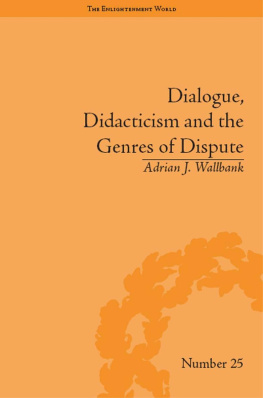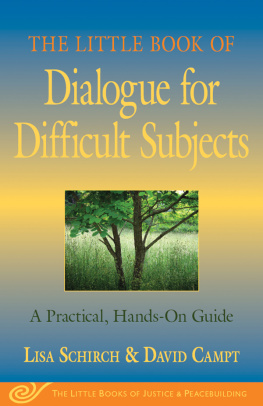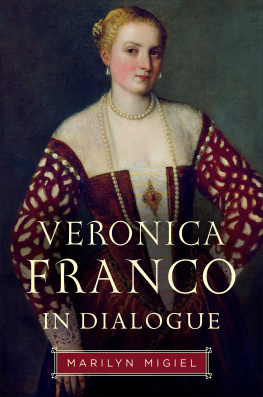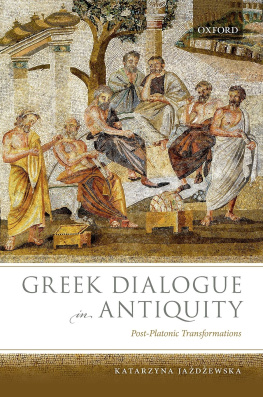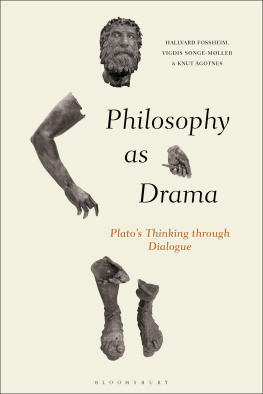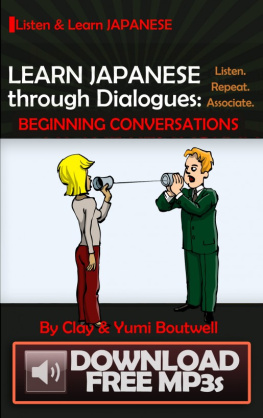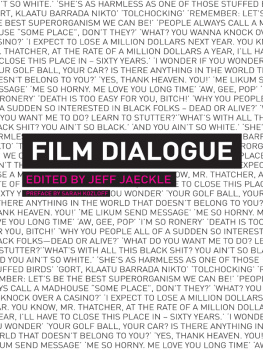DIALOGUE, DIDACTICISM AND THE GENRES OF DISPUTE: LITERARY DIALOGUES IN AN AGE OF REVOLUTION
THE ENLIGHTENMENT WORLD: POLITICAL AND INTELLECTUAL HISTORY OF THE LONG EIGHTEENTH CENTURY
Series Editor: | Michael T. Davis |
Series Co-Editors: | David Armitage Jack Fruchtman, Jr Iain McCalman
Jon Mee Paul Pickering |
Advisory Editor: | Hideo Tanaka |
TITLES IN THIS SERIES
1 Harlequin Empire: Race, Ethnicity and the Drama of the Popular Enlightenment
David Worrall
2 The Cosmopolitan Ideal in the Age of Revolution and Reaction, 17761832
Michael Scrivener
3 Writing the Empire: Robert Southey and Romantic Colonialism
Carol Bolton
4 Adam Ferguson: History, Progress and Human Nature
Eugene Heath and Vincenzo Merolle (eds)
5 Charlotte Smith in British Romanticism
Jacqueline Labbe (ed.)
6 The Scottish People and the French Revolution
Bob Harris
7 The English Deists: Studies in Early Enlightenment
Wayne Hudson
8 Adam Ferguson: Philosophy, Politics and Society
Eugene Heath and Vincenzo Merolle (eds)
9 Rhyming Reason: The Poetry of Romantic-Era Psychologists
Michelle Faubert
10 Liberating Medicine, 17201835
Tristanne Connolly and Steve Clark (eds)
11 John Thelwall: Radical Romantic and Acquitted Felon
Steve Poole (ed.)
12 The Evolution of Sympathy in the Long Eighteenth Century
Jonathan Lamb
13 Enlightenment and Modernity: The English Deists and Reform
Wayne Hudson
14 William Wickham, Master Spy: The Secret War against the French Revolution
Michael Durey
15 The Edinburgh Review in the Literary Culture of Romantic Britain: Mammoth and Megalonyx
William Christie
16 Montesquieu and England: Enlightened Exchanges, 16891755
Ursula Haskins Gonthier
17 The Sublime Invention: Ballooning in Europe, 17831820
Michael R. Lynn
18 The Language of Whiggism: Liberty and Patriotism, 18021830
Kathryn Chittick
19 Romantic Localities: Europe Writes Place
Christoph Bode and Jacqueline Labbe (eds)
20 William Godwin and the Theatre
David OShaughnessy
21 The Spirit of the Union: Popular Politics in Scotland
Gordon Pentland
22 Ebenezer Hazard, Jeremy Belknap and the American Revolution
Russell M. Lawson
23 Robert and James Adam, Architects of the Age of Enlightenment
Ariyuki Kondo
24 Sociability and Cosmopolitanism: Social Bonds on the Fringes of the Enlightenment
Scott Breuninger and David Burrow (eds)
FORTHCOMING TITLES
British Visions of America, 17751820: Republican Realities
Emma Vincent Macleod
DIALOGUE, DIDACTICISM AND THE GENRES OF DISPUTE: LITERARY DIALOGUES IN AN AGE OF REVOLUTION
BY
Adrian J. Wallbank
First published 2012 by Pickering & Chatto (Publishers) Limited
Published 2016 by Routledge
2 Park Square, Milton Park, Abingdon, Oxon OX14 4RN
711 Third Avenue, New York, NY 10017, USA
Routledge is an imprint of the Taylor & Francis Group, an informa business
Taylor & Francis 2012
Adrian J. Wallbank 2012
To the best of the Publishers knowledge every effort has been made to contact relevant copyright holders and to clear any relevant copyright issues. Any omissions that come to their attention will be remedied in future editions.
All rights reserved, including those of translation into foreign languages. No part of this book may be reprinted or reproduced or utilised in any form or by any electronic, mechanical, or other means, now known or hereafter invented, including photocopying and recording, or in any information storage or retrieval system, without permission in writing from the publishers.
Notice:
Product or corporate names may be trademarks or registered trademarks, and are used only for identification and explanation without intent to infringe.
BRITISH LIBRARY CATALOGUING IN PUBLICATION DATA
Wallbank, Adrian J.
Dialogue, didacticism and the genres of dispute: literary dialogues in the age of revolution. (The Enlightenment world)
1. Dialogue in literature. 2. Direct discourse in literature. 3. Dialogues, English History and criticism. 4. Didactic literature, English History and criticism. 5. Persuasion (Rhetoric) 6. Persuasion (Rhetoric) in literature. 7. Romanticism Great Britain. 8. English literature 18th century History and criticism. 9. English literature 19th century History and criticism.
I. Title II. Series
820.92609033-dc23
ISBN-13: 978-1-84893-279-1 (hbk)
Typeset by Pickering & Chatto (Publishers) Limited
CONTENTS
The bird of wisdom flies low, and seeks her food under hedges: the eagle himself would be starved if he always soared aloft and against the sun (Walter Savage Landor, Imaginary Conversations of Greeks and Romans [Diogenes and Plato], 1829)
Those who are acquainted with me know that I often keep my cards very close to my chest, and as such the debts that I have accrued during the course of my studies are worth acknowledging all the more. In the early days E. N. Brown and all of the staff at Maple Hayes School and Research Centre did an incredible job of helping me overcome my dyslexia to the extent that I can compete on equal terms with my peers. Mike Benford helped lay the foundations of my enthusiasm for the Romantic period during my time at Burton College, while at Staffordshire University, Aidan Arrowsmith, Peter Heaney and Sue McPherson helped to foster my interests in ever more productive ways. At York, Jane Moody and Jack Donovan first introduced me to dialogues and encouraged me to pursue this research, while John Barrell provided useful initial feedback. At Warwick, I would like to thank Karen OBrien, Jacqueline Labbe, Jonathan Bate, Thomas Docherty and Catherine Bates, all of whom have read sections of this work and have provided useful comments. In particular, I would like to offer my sincere thanks to Jon Mee, who has offered invaluable encouragement and even suggested the title, and Michael John Kooy, who has been outstandingly patient and diligent in his support and guidance for many years. I am sure he will be all too glad to see the back of both me and my dialogues!
I also owe a great deal of gratitude to the numerous people who have helped in non-academic ways. In the absence of any form of funding, I would like to thank my parents and also Warwickshire County Council for providing me with regular employment. My colleagues at the Severn Valley Railway have helped keep my feet firmly on the ground, particularly Phil Oliver whose various quirky obsessions have been a constant source of amusement. Wendy and Brian C. Fletcher have worked miracles in keeping body and soul together, Rachel Hargreaves did a fantastic job of supporting and understanding me, while Halal, Ajay, Jules and all of the team at India Garden have done a superb job of keeping me both fed and watered for many years. Finally, I would like to express my particular thanks to my mother and my dog, both of whom have faced all of the various crises I could throw at them with love, good humour and patience.

